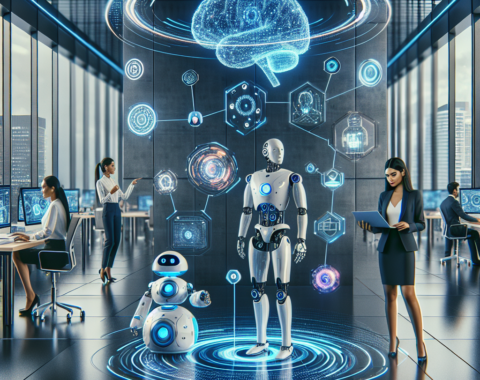
Model Context Protocol Revolutionizes AI Development and Understanding
In the rapidly evolving world of artificial intelligence, a new paradigm is emerging that promises to transform how we develop, deploy, and understand AI models. Enter the Model Context Protocol (MCP), a groundbreaking framework designed to bridge gaps, simplify processes, and enhance communication between AI systems and developers.
Understanding the Model Context Protocol
The Model Context Protocol is more than just another tool in the AI developer’s toolkit. It represents a shift towards a more holistic, context-aware approach to AI design and implementation. At its core, MCP seeks to address the disjointed nature of AI model development where systems often function in isolation, lacking the ability to share context effectively.
Key Features of the Model Context Protocol
- Interoperability: MCP ensures seamless communication between diverse AI models, allowing them to share context and information more efficiently.
- Scalability: With a focus on scalability, MCP supports the development of AI models that can easily grow in capacity and complexity.
- Contextual Awareness: By embedding contextual understanding within AI models, MCP enhances decision-making processes and improves model accuracy.
The Model Context Protocol addresses a critical need in AI development by offering a standardized approach that can be adopted across various platforms and applications, making it easier for developers to create robust, context-aware models.
How MCP Is Transforming AI Development
The introduction of MCP represents a significant shift in the way AI models are constructed and utilized. Here are some of the ways MCP is revolutionizing AI development:
Breaking Down Silos
One of the persistent challenges in AI development is the tendency for models to operate in silos, each designed for a specific task with limited interaction with other systems. MCP facilitates cross-model communication, enabling a more integrated approach where models can complement each other’s capabilities.
Enhancing Human-AI Interaction
With the integration of context-based understanding, MCP enhances the interaction between AI systems and their human users. This advancement leads to:
- Improved user experiences, with AI systems offering more relevant and personalized responses.
- Enhanced trust and reliability, as systems become more intuitive and aligned with human expectations.
Boosting AI Model Transparency
Transparency remains a key concern in AI ethics. By standardizing context sharing and comprehension, MCP enhances transparency, making it clearer how decisions are made and facilitating easier auditing processes.
The Broader Implications of MCP
The implementation of the Model Context Protocol is not just beneficial for developers and engineers. The potential of MCP extends far beyond, influencing a variety of industries and academic disciplines:
Industries Revolutionized
Industries such as healthcare, finance, and logistics are already beginning to see the potential impact of MCP. Its ability to facilitate communication between isolated AI systems allows for:
- Healthcare: Improved diagnostic tools that can integrate data from various sources to offer comprehensive patient insights.
- Finance: Enhanced fraud detection systems that utilize cross-referencing abilities to identify suspicious patterns.
- Logistics: More efficient supply chain management through improved predictive analytics and demand forecasting.
Academic Research and Development
The academic world stands to benefit significantly from MCP as well, with research initiatives becoming more collaborative and interdisciplinary:
- Facilitated data sharing and collaborative research endeavors.
- Potential for breakthroughs in understanding AI decision-making and ethics.
The Future of AI and MCP
As AI continues to integrate into nearly every aspect of our lives, the need for a robust and scalable framework like MCP is clear. Looking ahead, the widespread adoption of MCP could set new standards for AI development, leading to more sophisticated, reliable, and intelligent systems.
Challenges and Opportunities
Despite its potential, the widespread adoption of the Model Context Protocol presents certain challenges:
- Training and Infrastructure: Transitioning to MCP requires substantial training for developers and upgrades to existing infrastructure.
- Security Concerns: Ensuring secure context-sharing mechanisms to protect sensitive information.
- Regulatory Compliance: Navigating different regulatory environments as MCP is implemented globally.
However, these challenges also bring new opportunities for innovation, including the development of more secure, efficient, and adaptable AI systems.
Conclusion
The Model Context Protocol is set to reimagine the landscape of AI development. By promoting interoperability, enhancing contextual understanding, and improving transparency, MCP is positioned as a crucial development in the journey towards more integrated and effective AI systems. As developers and industries embrace this innovative protocol, the potential for a more interconnected and intelligent future becomes increasingly within reach.




